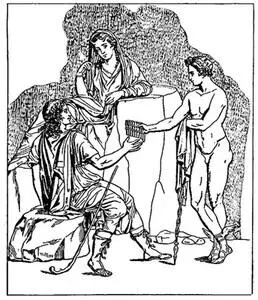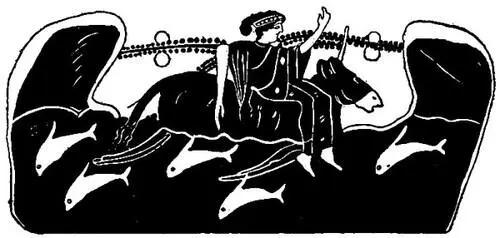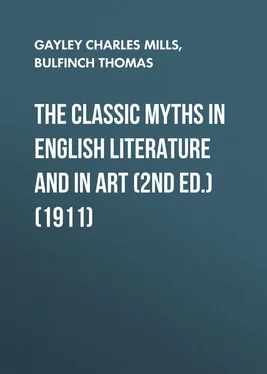Thomas Bulfinch - The Classic Myths in English Literature and in Art (2nd ed.) (1911)
Здесь есть возможность читать онлайн «Thomas Bulfinch - The Classic Myths in English Literature and in Art (2nd ed.) (1911)» — ознакомительный отрывок электронной книги совершенно бесплатно, а после прочтения отрывка купить полную версию. В некоторых случаях можно слушать аудио, скачать через торрент в формате fb2 и присутствует краткое содержание. Жанр: foreign_antique, foreign_prose, на английском языке. Описание произведения, (предисловие) а так же отзывы посетителей доступны на портале библиотеки ЛибКат.
- Название:The Classic Myths in English Literature and in Art (2nd ed.) (1911)
- Автор:
- Жанр:
- Год:неизвестен
- ISBN:нет данных
- Рейтинг книги:4 / 5. Голосов: 1
-
Избранное:Добавить в избранное
- Отзывы:
-
Ваша оценка:
- 80
- 1
- 2
- 3
- 4
- 5
The Classic Myths in English Literature and in Art (2nd ed.) (1911): краткое содержание, описание и аннотация
Предлагаем к чтению аннотацию, описание, краткое содержание или предисловие (зависит от того, что написал сам автор книги «The Classic Myths in English Literature and in Art (2nd ed.) (1911)»). Если вы не нашли необходимую информацию о книге — напишите в комментариях, мы постараемся отыскать её.
The Classic Myths in English Literature and in Art (2nd ed.) (1911) — читать онлайн ознакомительный отрывок
Ниже представлен текст книги, разбитый по страницам. Система сохранения места последней прочитанной страницы, позволяет с удобством читать онлайн бесплатно книгу «The Classic Myths in English Literature and in Art (2nd ed.) (1911)», без необходимости каждый раз заново искать на чём Вы остановились. Поставьте закладку, и сможете в любой момент перейти на страницу, на которой закончили чтение.
Интервал:
Закладка:

Fig. 47. Io, Argus, and Mercury
Jupiter, grieved by the sufferings of his mistress, sent Mercury to dispatch Argus. Mercury took his sleep-producing wand and presented himself on earth as a shepherd driving his flock. As he strolled, he blew upon his syrinx or Pandean pipes. Argus listened with delight. "Young man," said he, "come and take a seat by me on this stone. There is no better place for your flock to graze in than hereabouts, and here is a pleasant shade such as shepherds love." Mercury sat down, talked, told stories till it grew late, and played upon his pipes his most soothing strains, hoping to lull the watchful eyes to sleep, but in vain; for Argus still contrived to keep some of his eyes open, though he shut the rest.
But among other stories, Mercury told him how the instrument on which he played was invented. "There was a certain nymph," said he, "whose name was Syrinx, – much beloved by the satyrs and spirits of the wood. She would have none of them, but was a faithful worshiper of Diana and followed the chase. Pan, meeting her one day, wooed her with many compliments, likening her to Diana of the silver bow. Without stopping to hear him she ran away. But on the bank of the river he overtook her. She called for help on her friends, the water-nymphs. They heard and consented. Pan threw his arms around what he supposed to be the form of the nymph and found he embraced only a tuft of reeds. As he breathed a sigh, the air sounded through the reeds and produced a plaintive melody. Whereupon the god, charmed with the novelty and with the sweetness of the music, said, 'Thus, then, at least, you shall be mine.' Taking some of the reeds of unequal lengths and placing them together, side by side, he made an instrument and called it Syrinx, in honor of the nymph." Before Mercury had finished his story he saw the eyes of Argus all asleep. At once he slew him and set Io free. The eyes of Argus Juno took and scattered as ornaments on the tail of her peacock, where they remain to this day.
But the vengeance of Juno was not yet satiated. She sent a gadfly to torment Io, who, in her flight, swam through the sea, named after her, Ionian. Afterward, roaming over many lands, she reached at last the banks of the Nile. Then Jupiter interceded for her; and upon his engaging not to pay her any further attention, Juno consented to restore her to her form.
In a poem dedicated to Leigh Hunt, by Keats, the following allusion to the story of Pan and Syrinx occurs:
So did he feel who pulled the boughs aside,
That we might look into a forest wide, …
Telling us how fair trembling Syrinx fled
Arcadian Pan, with such a fearful dread.
Poor nymph – poor Pan – how he did weep to find
Nought but a lovely sighing of the wind
Along the reedy stream; a half-heard strain,
Full of sweet desolation, balmy pain.
58. Callistoof Arcadia was another maiden who excited the jealousy of Juno. Her the goddess changed into a bear. Often, frightened by the dogs, Callisto, though lately a huntress, fled in terror from the hunters. Often, too, she fled from the wild beasts, forgetting that she was now a wild beast herself; and, bear as she was, she feared the bears.
One day a youth espied her as he was hunting. She saw him and recognized him as her son Arcas, grown to manhood. She stopped and felt inclined to embrace him. He, alarmed, raised his hunting spear and was on the point of transfixing her, but Jupiter arrested the crime and, snatching away both of them, placed them in the heavens as the Great and Little Bear.
Juno, enraged at seeing her rival so set in honor, hastened to ancient Tethys and Oceanus and, complaining that she was supplanted in Heaven, cried, "So do my punishments result – such is the extent of my power! I forbade her to wear human form, – she and her hateful son are placed among the stars. Better that she should have resumed her former shape, as I permitted Io to do. Perhaps my husband means to take her to wife, and put me away! But you, my foster parents, if you feel for me, and see with displeasure this unworthy treatment of me, show it, I beseech you, by forbidding this guilty couple from coming into your waters." The powers of the Ocean assented, and consequently the two constellations of the Great and Little Bear move round and round in the neighborhood of the pole, but never sink, as do the other stars, beneath the Ocean. 67 67 Ovid, Metam. 2, 410 et seq.
59. Europawas the daughter of Agenor, king of Phœnicia, son of the god Neptune. The story of Jupiter's love for her is thus told by the idyllic poet, Moschus:
To Europa, princess of Asia, once on a time, a sweet dream was sent by Cypris… Then she beheld two continents at strife for her sake, Asia and the further shore, both in the shape of women. Of these one had the guise of a stranger, the other of a lady of that land, and closer still she clung about her maiden, and kept saying how she was her mother, and herself had nursed Europa. But that other with mighty hands, and forcefully, kept haling the maiden, nothing loth; declaring that, by the will of ægis-bearing Jupiter, Europa was destined to be her prize.
But Europa leaped forth from her strown bed in terror, with beating heart, in such clear vision had she beheld the dream… And she said, "Ah! who was the alien woman that I beheld in my sleep? How strange a longing for her seized my heart, yea, and how graciously she herself did welcome me, and regard me as it had been her own child! Ye blessed gods, I pray you, prosper the fulfillment of the dream!"
Therewith she arose, and began to seek the dear maidens of her company, girls of like age with herself, born in the same year, beloved of her heart, the daughters of noble sires, with whom she was always wont to sport, when she was arrayed for the dance, or when she would bathe her bright body at the mouths of the rivers, or would gather fragrant lilies on the leas…
Now the girls, so soon as they were come to the flowering meadows, took great delight in various sorts of flowers, whereof one would pluck sweet-breathed narcissus, another the hyacinth, another the violet, a fourth the creeping thyme; and on the ground there fell many petals of the meadows rich with spring. Others, again, were emulously gathering the fragrant tresses of the yellow crocus; but in the midst of them all the princess culled with her hand the splendor of the crimson rose, and shone preëminent among them all like the foam-born goddess among the Graces. Verily, she was not for long to set her heart's delight upon the flowers… For of a truth, the son of Cronus, so soon as he beheld her, was troubled, and his heart was subdued by the sudden shafts of Cypris, who alone can conquer even Jupiter. Therefore, both to avoid the wrath of jealous Juno, and being eager to beguile the maiden's tender heart, he concealed his godhead, and changed his shape, and became a bull…

Fig. 48. Europa on the Bull
He came into the meadow, and his coming terrified not the maidens, nay, within them all wakened desire to draw nigh the lovely bull, and to touch him, and his heavenly fragrance was scattered afar, exceeding even the sweet perfume of the meadows. And he stood before the feet of fair Europa, and kept licking her neck, and cast his spell over the maiden. And she still caressed him, and gently with her hands she wiped away the deep foam from his lips, and kissed the bull. Then he lowed so gently, ye would think ye heard the Mygdonian flute uttering a dulcet sound.
Читать дальшеИнтервал:
Закладка:
Похожие книги на «The Classic Myths in English Literature and in Art (2nd ed.) (1911)»
Представляем Вашему вниманию похожие книги на «The Classic Myths in English Literature and in Art (2nd ed.) (1911)» списком для выбора. Мы отобрали схожую по названию и смыслу литературу в надежде предоставить читателям больше вариантов отыскать новые, интересные, ещё непрочитанные произведения.
Обсуждение, отзывы о книге «The Classic Myths in English Literature and in Art (2nd ed.) (1911)» и просто собственные мнения читателей. Оставьте ваши комментарии, напишите, что Вы думаете о произведении, его смысле или главных героях. Укажите что конкретно понравилось, а что нет, и почему Вы так считаете.












